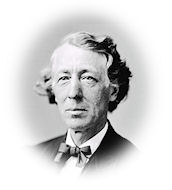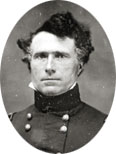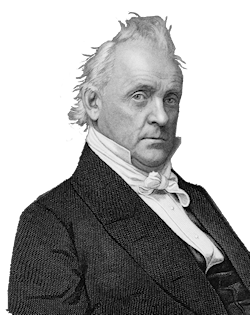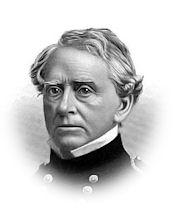I have been repeatedly warned by persons having the opportunity to know, and who are entitled to the highest confidence, that the secession leaders in Washington have resolved that the Border States, and especially Maryland, shall be precipitated into secession with the Cotton States before the 4th of March. They have resolved to seize the Federal capital and public archives, so that they may be in a position to be acknowledged by foreign governments as the United States; and the assent of Maryland is necessary, as the District of Columbia would revert to her in case of a dissolution of the Union. The plan contemplates forcible opposition to Mr. Lincoln’s inauguration, and consequently civil war upon Maryland soil, and a transfer of its horrors from the States which are to provoke it.
Turning on the Light: A Dispassionate Survey of President Buchanan’s Administration, From 1860 to its Close, by Horatio King

“The question now is union or disunion.”—Horatio King (soon to be Postmaster General for the last part of the Buchanan Administration)
Washington, Dec. 30,1860.
My Dear Sir,—I rejoice to learn that the disunionists failed yesterday in their impudent and insulting demand that the administration should remove Major Anderson or otherwise degrade him.
It is every day becoming more and more apparent that they are determined, as far as lies in their power, to make use of the administration to strengthen themselves in their rebellious position, and, if necessary for their purpose, to break up the Government. Does it require any close discernment to see that it would be fatal to follow their counsels?
They commenced, long before the election, by getting possession of the Constitution newspaper, which, from the announcement of Lincoln’s election, has been openly for a dissolution of the Union, and some of them have continued, and still continue, to hold office here in the Government, although known to be hostile to that very Government which feeds them!
In a letter to the President on the 7th of November,—the day after election,—I called attention to these startling facts ; and, from that day to the present, my amazement has increased until I am, at times, almost paralyzed to see such things go unrebuked. It is all folly for the editor of that paper to issue his pronunciamentoes that he alone is responsible . . . so long as it is supported and kept alive by Government advertisements which it receives solely through the favor of the administration, for it is not entitled to them by law. Has not this fact been overlooked in the pressure of the great troubles now threatening our destruction ?
The question now is union or disunion. An article in that paper today advises that Lincoln’s inauguration be prevented by armed force! Can the Government give such a paper patronage and escape the charge of treason? We must now take sides either for or against the continuance of the Union; and the sooner we know where we stand the better.
I wrote you yesterday hastily what I regard as the clear duty of the Government in reference to Major Anderson, and I am confirmed in my opinions by everybody to whom I have spoken since, as well as by the press, several extracts of which I beg to inclose for your perusal.
The duty of the administration, it seems to me, is very plain. It is simply to see that the laws are executed, thus maintaining, with a firm hand, the integrity of the Union. In this, rest assured, every friend of the Union will sustain you.
I have the honor to be
Very truly your friend,
Horatio King.
Hon. I. Toucey
Sec’y Navy.

“Northern men all seem to be dumb and paralyzed!”—Horatio King (soon to be Buchanan administration’s last Postmaster General)
(Confidential.)
P. O. Dept., Dec. 28, 1860.
My Dear Sir,—I feel as though we were on the verge of civil war, and I should not be surprised if this city is under the military control of the disunionists in less than one month! There can be no doubt that the Cabinet is divided, and rumor has it that the sympathies of the President, as well as of Mr. Toucey, are with the disunionists in reference to the question of sustaining Major Anderson! Holt, Black, and Stanton are firm for the Union, there can be no doubt.
Is there no way to bring a healthful influence to bear on the President and Governor Toucey? Northern men all seem to be dumb and paralyzed!
In haste, yours truly,
Horatio King.
Nahum Capen, Esq.
(Private.)
Washington, 22d December, 1860.
My Dear Sir,—I have received your favor of the 20th inst, and rejoice to learn the change of public sentiment in your city. Still secession is far in advance of reaction, and several of the cotton States will be out of the Union before anything can be done to check their career. I think they are all wrong in their precipitation, but such I believe to be the fact.
It is now no time for resolutions of kindness from the North to the South. There must be some tangible point presented, and this has been done by Mr. Crittenden in his Missouri Compromise resolutions. Without pretending to speak from authority, I believe these would be accepted though not preferred by the South. I have no reason to believe that this is at present acceptable to the Northern senators and representatives, though the tendency is in that direction. They may arrive at this point when it will be too late.
I cannot imagine that any adequate cause exists for the extent and violence of the existing panic in New York. Suppose, most unfortunately, that the cotton States should withdraw from the Union, New York would still be the great city of this continent. We shall still have within the borders of the remaining States all the elements of wealth and prosperity. New York would doubtless be somewhat retarded in her rapid march; but, possessing the necessary capital, energy, and enterprise, she will always command a very large portion of the carrying trade of the very States which may secede. Trade cannot easily be drawn from its accustomed channels. I would sacrifice my own life at any moment to save the Union, if such were the will of God; but this great and enterprising brave nation is not to be destroyed by losing the cotton States, even if this loss were irreparable, which I do not believe unless from some unhappy accident.
I have just received an abstract from the late census.
In the apportionment of representatives the State of New York will have as many in the House (30) as Georgia, Florida, Alabama, Mississippi, Louisiana, Texas, and South Carolina united. The latter State contains 296,422 free people and 408,905 slaves, and will be entitled in the next Congress to 4 representatives out of 233.
Why will not the great merchants of New York examine the subject closely and ascertain what will be the extent of their injuries and accommodate themselves to the changed state of things ?
If they will do this, they will probably discover they are more frightened than hurt. I hope the Treasury Note Loan may be taken at a reasonable rate of interest. No security can be better, in any event, whether the Cotton States secede or not. Panic in New York may, however, prevent, because panic has even gone to the extent of recommending that the great city of New York shall withdraw herself from the support of at least twenty-five millions of people and become a free city.
I had half an hour, and have scribbled this off in haste for your private use.
Your friend,
Very respectfully,
James Buchanan.
Royal Phelps, Esq.

“It may seem presumptuous”—Letter to the Attorney General from Horatio King, Buchanan’s last Postmaster General
Washington, Dec. 14, 1860.
My Dear Sir,—It may seem presumptuous in me, an humble subordinate, to address you on great matters of state, but my apology, if any is necessary, must be that I am an American citizen, with all that ardent love for my country and its government which should ever animate the true patriot, and especially in times of danger like the present.
I am amazed that some decided action is not taken by the Government to cut itself entirely loose from disunion and disunionists. Look at the Constitution newspaper of to-day—and, indeed, I may say, of every issue since the Presidential election. Its whole bearing is for disunion; and, say what you will, the Government is held, and will be held, in a great degree responsible for it. It was the organ to which the message was confidentially intrusted, and its columns are daily filled with advertisements which it receives and can receive only by favor of the President, for its circulation would not secure them to it by law.
I saw, as every person of observation must have seen, the very day after the election, that its influence was directed toward secession, and I felt myself compelled immediately to call the attention of the President to it, as I did in a letter, a copy of which I herewith inclose for your perusal.
I know how the President is pressed by the secessionists, and I sympathize fully in all reasonable measures to be taken within the Union to secure the rights of the South, and consign to infamy the leaders of black republicanism at the North; but, as his devoted friend and the friend of every member of his Cabinet, I cannot restrain myself from the expression of the deepest astonishment and mortification that the Government should for one moment allow itself to occupy such a position as to afford even its enemies a pretext to charge it with giving the slightest countenance, either directly or indirectly, to secession or secessionists.
Is it not possible to relieve the administration from the infamy which must attach to it for all time, so far as it is made responsible for the course of the Constitution, and for keeping men in responsible positions who are known and avowed disunionists? For God’s sake, let us see the Government placed squarely and unequivocally on the side of the Union I With great respect,
Very sincerely your friend,
Horatio King.
Hon. J. S. Black, Attorney-General U. S.
(Private.)
P. O. Dept., Appt. Office, Dec. 12, 1860.
My Dear Sir,—Your note of yesterday is received.
It is becoming every day more and more apparent that there is quite a large party at the South who, traitors at heart, are resolved on effecting a dissolution of the Union, even though the North were to yield to the utmost of their former demands, and these men are now in the lead. One of them kept his place in the government till forced to resign from very shame, and there are others of smaller calibre who are still retained, —traitors in the camp.
And we are to allow the best government in the world to be destroyed in the first hour of danger, without an effort to demonstrate that if statesmen will but do their duty it is capable of withstanding far more serious shocks than that with which it is now threatened. What mockery of statesmanship! What imbecility ! What culpable wickedness! Will not the God of nations send down his thunderbolts and arrest the base wretches who are thus plotting our ruin?
It seems now to be pretty generally conceded that the cotton States will secede, and the next thing is to avoid a conflict on that account, or the whole country will be ablaze with civil war!
Very respectfully and truly yours,
Horatio King.
Hon. John A. Dix, New York.
Concord, N. H., Dec. 6,1860.
My Deak Sir,—Your letter of November 30 I found here on my return from Hillsboro yesterday, and also several northern papers containing my letter to Secretary Thompson.
Since the action of the Vermont Legislature upon the report of the Judiciary Committee of the House of Representatives, declaring the ‘personal liberty bill’ of that State to be clearly unconstitutional, I am in despair with regard to any amendment of errors at the North, so far as the question of slavery is concerned. Reason has surrendered its throne, all sense of patriotism, justice, and right seems to have departed forever from the black Republican portion of the country. If the legislature of this State were convened to-day, I do not believe that they would repeal their unconstitutional laws. When I say this you will understand that I think the Union has already reached its termination.
It seems to me that few men in this crisis suffer so keenly as I do. With regard to pecuniary loss, it is nothing. I do not take it into the account. It is not worth considering. We can all have bread, if we will work for it, but we shall never have again the glorious ensign of our country, which has been the object of our just admiration, the type of our power, and the shield of our protection the world over.
Your friend,
Franklin Pierce.

Franklin Pierce: The blackness is gathering so fast that if anything can be done to save our glorious Union it must be done speedily.
Andover, Mass., November 28,1860.
My Dear Sir,—I have received your kind, earnest letter, and participate strongly in your apprehensions. To my vision the political horizon shuts down close and darkly. It may be that light is to break ‘through somewhere, but I do not discern the quarter whence it is to come. I had occasion to write a friendly letter to Secretary Thompson (Interior) a day or two since, and expressed to him briefly my convictions and fears and hopes in relation to the present state of public affairs. I did not expect that letter to be published, but the blackness is gathering so fast that if anything can be done to save our glorious Union it must be done speedily, and, in my judgment, at the North chiefly. If you call on the Secretary he will show you that letter, and if he thinks the publication of it would be useful, he can use it as he pleases. The truth must appear that it was written in the course of friendly correspondence, and not with a view to publication. Among intelligent, reflecting men, alarm is evidently increasing here daily. One decisive step in the way of coercion will drive out all the slave-labor States. Of that I entertain no doubt. My suggestion about the tone and temper of Congress, and the importance of temperate words and actions might possibly have some degree of good influence, and there is, perhaps, more hope that the letter might be serviceable just at this juncture at the North; but it was hastily written, and my friend, the Secretary, must judge. If you call on him, show him this note.
In haste, your friend,
Franklin Pierce.
P. O. Dept., Appt. Office, November 27,1860.
My Dear Sir,—Our chief clerk, Mr. Clements, and myself had an hour with the President last evening, and our interview was most satisfactory. Mr. C. has just returned from Tennessee, and brings good news from that State to the effect that nearly everybody there is opposed to the hasty action of South Carolina, and is in favor of one more effort to preserve their rights in the Union. The President appeared to be much gratified to be reassured of this. He is, as I supposed, a firm Union man. I told him about your writing to and not receiving any answer from Mr. Cobb, and he remarked that it would not do the slightest good to write to him. I expressed myself freely to him about the course of the Constitution newspaper, and told him how much it had injured him, etc., etc. I have no doubt he will take strong ground in his message against secession, as well as the right of secession; but were I allowed to guess, I would say that he will not be in favor of using force unless the property of the United States is interfered with, such as the taking of the forts, etc., when he would be obliged to act.
Very truly,
Horatio King.
HON. John A. Dix, P. M., New York.
(Unofficial.)
P. O., New York, November 27,1860.
My Dear Sir,—It is impossible for me to leave here at this moment, and I have an insuperable repugnance to a visit to Washington. On receipt of your letter I sat down to write to the President, but constant interruptions prevented me from finishing it. Besides I have some doubt whether it would do good. I have made some inquiry in regard to the editor of the ‘Constitution,’ and incline to the belief that he cannot be influenced from this quarter. At all events, those who might influence him think as he does. I am, in a quiet way, doing all I can to promote a better feeling at the South. I am sorry to say that nothing I have yet done has met with a response from any of our Southern friends. I believe we shall have to rely entirely on the efforts of our conservative friends there. They seem at present to be overborne by the general excitement. I cannot think this will last. There must, at least, be an effort to prevent a dissolution. I trust events here may aid the conservative movement there. Vermont is moving to repeal her personal liberty bills, with what success remains to be seen. Massachusetts will follow her lead, and, I think, will repeal.
I shall send my letter to the President this evening or to-morrow.
With sincere regards, yours,
John A. Dix.
Hon. Horatio King.



